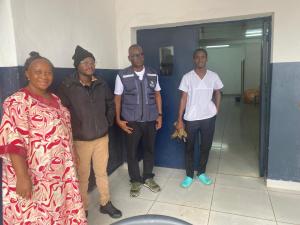Mpox doesn’t discriminate”: A survivor’s story of hope, healing, and community
Makeni, Sierra Leone – July 2025
When Mr. Bambay Sawanneh first felt cold and fever one evening, he did what many in his community would do, he stayed in bed, applied ointments, and took malaria tablets. As a busy community leader, head of an orphanage, school proprietor, and football club manager, Mr. Sawanneh assumed it was just another common illness. But after three days with no improvement, he took a different path, one that would not only save his life but inspire many others.
“I remembered the awareness posters I had seen. The symptoms looked like mpox, and I didn’t want to take any chances,” he said.
He dialed 117, the national emergency health hotline in Sierra Leone. The response was swift. The team collected his details, arranged transportation, and referred him to the government hospital in Makeni. There, he tested positive for Mpox and was admitted to the isolation center for treatment.
“The experience was nothing like what I feared,” he recalls. “The healthcare workers, doctors, nurses, surveillance team, even the cleaners gave us hope. They treated us with dignity and constantly reminded us that mpox is curable.”
Recovery was not just physical it was emotional and psychological. Encouragement from health workers and testimonies from fellow survivors played a huge role in helping Mr. Sawanneh and others through their isolation period. Wounds were cleaned regularly, medication was administered on time, and the ward was kept clean and calm.
“This made all the difference,” he says. “We were treated like human beings, not patients. Like ministers or presidents.”
It was during this time of shared recovery that Mr. Sawanneh, along with others in the ward, created the “Mpox WhatsApp Group” a virtual space that quickly transformed into a lifeline.
“When new patients arrived and saw how many of us had recovered, they were encouraged. The group became a family,” he says. “We prayed together, shared updates, supported those in need with money for food or medicine, and kept each other strong.”
The group didn’t fade after discharge. It continues to meet virtually every Friday for “Hotspots,” a time when members share updates about their health, families, and lives after recovery.
Mr. Sawanneh’s story underscores a powerful truth: mpox knows no status. It affects individuals regardless of their position, occupation, or influence.
“As someone who leads schools, a football club, and an orphanage, I never thought I’d find myself in an isolation center. But disease does not discriminate. That’s why we all must take prevention seriously,” he emphasizes.
After recovery, he used his platform to advocate for awareness and encourage community ownership in the response.
“I tell people that going to the hospital saved my life. There is no shame in seeking help. I was never stigmatized because I chose to go through the right channels. Now, I talk to elders, youths, and families about what I went through. People listen because they know me.”
With the support of partners like the World Health Organization (WHO), the Government of Sierra Leone has continued to strengthen the mpox response through surveillance, risk communication, case management, and contact tracing. WHO has been instrumental in providing technical guidance, financial support, and on-the-ground capacity building for district health teams. The result is a more coordinated, community-focused response built on trust, education, and resilience.
Mr. Sawanneh’s message is clear: “Don’t self-medicate. Don’t wait too long. If you feel symptoms, call 117 or go to the nearest government hospital. You’ll be cared for with respect.”
He also urges the public to reject misinformation and stigma and instead lean into community engagement and solidarity.
“Mpox is real, but recovery is possible. The healthcare system is here to help. Let’s own the response together through awareness, early treatment, and looking out for each other.”
About WHO's Role in the Mpox Response
The World Health Organization continues to work alongside the Ministry of Health, the National Public Health Agency, and district-level response teams in Sierra Leone to fight the spread of Mpox. Through financial assistance, technical supervision, training, and logistical support, WHO is helping to strengthen surveillance systems, improve risk communication, and provide frontline health workers with the tools and skills they need to manage cases effectively. Central to the response is community involvement—ensuring that prevention and early treatment are championed by those most affected.



